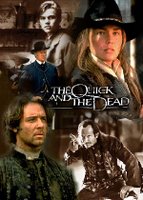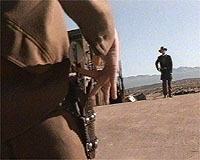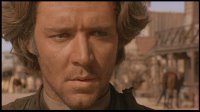 About genre movies that are about something:
About genre movies that are about something:The Quick and the Dead, Sam Raimi’s 1995 flick about a quick-draw contest, just plain works as a western.
In fact, it is clearly meant to be a tribute to the genre. The High Noon emphasis on clocks; the use and renewal of every gun fight cliché (he had fifteen showdowns to showcase); the classic yet novel uses of shadows (at one point the audience becomes aware of who lost a quickdraw by noticing a bullet sized beam of light in the middle of the gunman’s shadow); and even a character motivation reveal straight out of Once Upon a Time in the West (effectively done, may I add).
Of course, solid acting performances never hurt, and Raimi gets just that from Gene Hackman, Russell Crowe, Leonardo DiCaprio, Gary Sinise – who has, really, only one full scene, which he underplays to heartbreaking perfection – and a slue of supporting players. The one weak link is producer Sharon Stone, who’s not bad, just not good enough.
And, without a doubt, this flick is about something. In fact, it wears its theme on its sleeve – the setting is a town named Redemption, for goodness sake. But this is also in keeping with the genre, at least as redefined in the ‘70’s spaghetti westerns.

One of the story lines by screenwriter Simon Moore follows Cort (Crowe), a preacher forced into the contest by the vile Herod (Hackman). You see, Herod, a career baddie, runs the town – a fact he established over a decade ago by killing the marshal and becoming his own lawless law.
And Cort drives Herod a bit crazy. You see Cort used to be an outlaw in Herod’s gang, but he has repented of his evil ways and become a preacher. And Herod can’t stand the idea that anyone can repent.
Which is really marvelous, because, well, ain’t it the truth? Sin loves company, and detests the light.
I just picture the Biblical Herod, keeping John the Baptist alive in his dungeon, even though he can’t stand to hear his words of condemnation, but also can’t stand proving John right by killing him. He wants to test John, to prove that John is just like him, to show that he isn’t that bad…
And Hackman’s Herod wants to test Cort, to prove that he is just like Herod, to show that Herod isn’t that bad…
So he does his damnedest to force Cort to kill, to sin again.

And here’s the cool part – he succeeds.
This is a story of attempted redemption by flawed people, who still fall down after repenting, who still fall into their old ways. And still try to change, despite failure.
The film has many more layers – each character (including Herod) carries their own need for redemption, and have their own plan for achieving it. Virtually all of them fail, mostly because they are looking for redemption in the wrong saviors. (DiCaprio plays Herod’s bastard son; and looks for acceptance as a son from Herod. Now there’s a lose/lose situation.)
Unfortunately, the film doesn’t really find an ending that reaches redemption, devolving in the final moments into a simplistic revenge story. Cort himself is left with the potential to find redemption in a new career – between outlaw and preacher – but certainly doesn’t find it within the movie.
But that flaw doesn’t succeed in ruining what preceded it -- Raimi and Moore exploring the bigger questions, succeeding in layering a genre flick, and leaving us with hope that redemption may be around the corner.
And they still delivered one rootin’ tootin’ western.
Just my thoughts,
-Sean
1 comment:
Hmmm, I had forgotten how much I liked this movie until you brought it up. I generally don't like Westerns. (Maybe I just have a soft spot for Raimi)
I also enjoy Tombstone as well, but that is more for the camer work honestly.
~Ben
Post a Comment